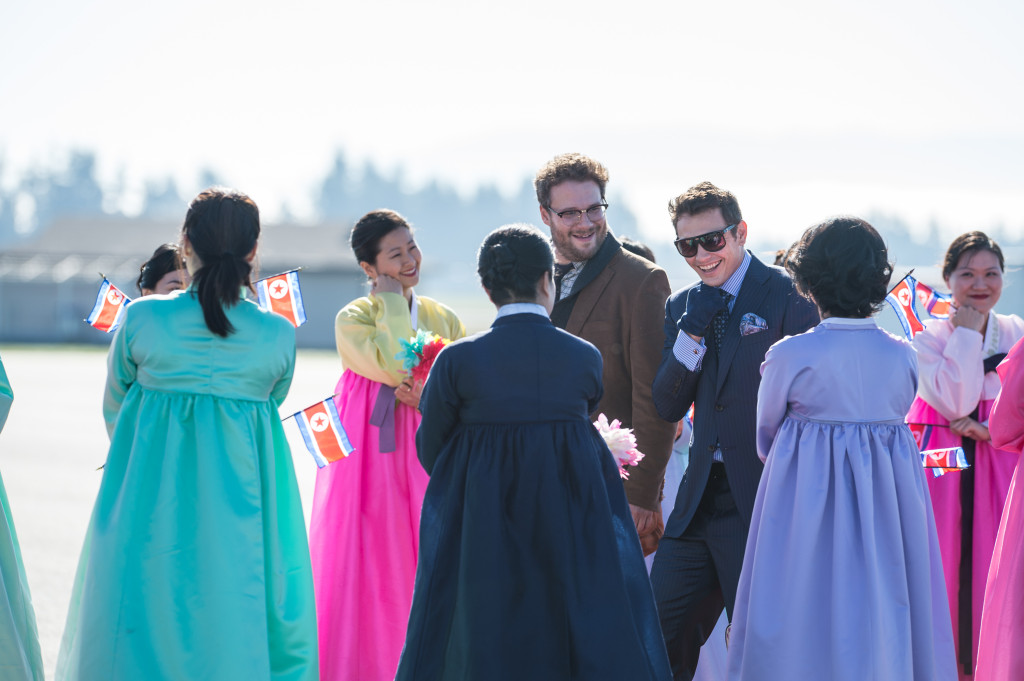Sony, freedom of speech and bad comedy
Recent festive-season controversy film The Interview, starring James Franco and Seth Rogen, graced very few screens across the USA, to the chagrin of Sony’s monied executives no doubt. The reason for this lack of distribution was (our usual political motivator) the threat of terrorism from a group of hackers reportedly working for the North Korean government. The Interview (UK release pending) follows two journalists who set off to North Korea to interview Kim Jong-un and assassinate him. Not having seen the film and knowing more about Franco and Rogen than I’d like to, I’d assume the film shows pretty much just this, surrounded by casual homophobia, professional sexism and the assumption that North Koreans are mind-controlled peons who’ll snap out of their ideology-induced idiocy once the US cleans up their country. Or, stepping out of the film for a second, providing a visual feast that will not simply be their The Great Dictator, but their complete Battleship Potemkin.
But who would really think that a Hollywood movie could do something like that? Rogen himself only goes so far as to hope that North Koreans would “really enjoy the movie.” So when some get up in arms about freedom of expression we can send back a derisive reply: ‘freedom for this…?’ If we can’t even watch The Interview, then the terrorists have already won, it seems.
Knowing more about Franco and Rogen than I’d like to, I’d assume the film shows pretty much just this, surrounded by casual homophobia, professional sexism and the assumption that North Koreans are mind-controlled peons who’ll snap out of their ideology-induced idiocy once the US cleans up their country.
Considering this hyperbole, we should wonder about what it takes for a film to be pulled and the reasons why. Terrorism is the perfect trigger word in the West if you want to demarcate the ‘for’ from the ‘against’ freedom/national identity/capitalist-democracy/ etc. But do we really have to see this as a censorship issue? Sony is a massive corporation with its fingers in more pies than you’d like to know, not Joshua Oppenheimer making documentaries where numerous members of the crew are credited as anonymous for fear of reprisals. The more pernicious censorship occurs through companies like Sony who dominate a cultural industry, squeezing out voices that won’t turn a profit while others make films that undermine this system (e.g. Oppenheimer).
I’m tempted here to opine that all films are always already political insofar as they are produced under specific conditions, but I think more is at stake here than simply reminding everyone that everything is political. What’s really at stake is that the discussion around censorship usually concerns films (words, paintings, songs) that were already established in the circuit; it’s only rarely that a film is picked up by those far from its original source and critically resonates with that audience. The Interview was never going to do this for North Koreans; not because it attacked their leader, but because the audience is clearly drab film-goers (even if you did watch Blue is the Warmest Colour and it warmed your socks off) who have no real stake in North Korea. Freedom of expression should not be about the formal freedom of everyone to make million-dollar films (an estimated $75million including advertising for The Interview), we should instead search for what Hito Steyerl calls ‘the poor image’: “the contemporary Wretched of the Screen, the debris of audiovisual production, the trash that washes up on the digital economies’ shores.”
Harkening back to Franz Fanon’s famous text justifying violence by the colonised against the colonials, Steyerl shows a way of understanding film that challenges those in power, namely Sony, while showing that the real work of expression is being done from the wastebin of production companies. Arguing for Sony’s freedom of expression clouds over the real issue of the lack of any expression of difference in Hollywood films. Not simply because The Interview is not like The Great Dictator, but because if all we can feel is either fear of others or cushy entertainment, then the question of expression has not even surfaced.
Image Source: Sony Pictures


Comments